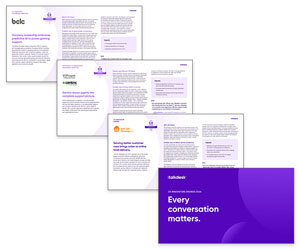Despite many changes that have happened to the internet, support forums seem to have remained essentially unchanged since their inception as bulletin boards back in the early 1970s
Orhan Ertughrul explores 5 areas where support forums are no longer up to the mark.
Support forums have hardly changed since their inception as bulletin boards back in the early 1970s. The first true web forum was developed by the W3 consortium back in 1994 – ancient web history. It was called WWW Interactive Talk (WIT) and it was thrown together in three days by a student at CERN.
Since then, internet forums have become the mainstay of community support initiatives at literally millions of organisations and clubs around the world. In recent years Facebook, Twitter and LinkedIn have got in on the act but they essentially provide the same type of bulletin board functionality where someone can initiate a thread and others can comment on it.
Why has the technology become so universal? Most organisations can see that if they have an expert user base then engaging them to answer questions from the community can be an effective way of preventing calls to the call centre and lowering costs.
The problem is that forums were never designed to provide support. In fact, they provide a fairly poor medium for support, and little has been done over the years to improve this. The reasons are multi-fold but let’s look at each in turn.
1. Distinguishing between discussions and problems
In any forum there tend to be two types of post, discussions and problems. Each of these should really be treated in a different way. Often a search for relevant material on a certain problem will result in a number of search results in order of community rating. However, when you want an answer to a problem then highly rated community discussions are less likely to be of use to you. One or two solution providers are now realising that they should make this distinction but they’re still not actually treating the two types of post differently.
2. Collecting the right data for problem solving
In any phone support call you can pretty much guarantee that the service engineer will walk you through a set of data-gathering questions designed to help them narrow down the problem. The same thing can happen in a forum thread but it tends to be a tortuous process with many posts required before enough information is available to answer the question. This process could be made so much easier.
Collecting the correct data for solving a problem is also important for building effective meta-data around an issue. This is partly a classical knowledge management problem: how do you ensure that you return the right solution to a customer from a search query? With classical forum implementations this is difficult, because most of the time you’re relying on community ratings and keywords harvested from the title and text of the issue.
What features should support forum software contain?
- Discussion or Problem should be a selectable choice, with each type of post being treated differently.
- Data for problem solving should be collected at the point the post is created using structured and automated data collection techniques. This will ensure faster resolution and more accurate search results.
- Auto-response will ensure that newcomers to the community will have a better experience with their questions being answered quickly and automatically from previously submitted solutions.
- Critical information should be provided in rich media format by the owner of the community, ensuring that the common questions have high quality answers.
- Tagging resolved issues will allow for assessment of the effectiveness of your support community.
- Value assessment should be made far easier by the other changes outlined above.
- Sharing of content with other social media solutions should be simpler and more commonplace.
3. Helping newcomers
Anyone who has used a support forum has come across that post from the board newbie where he makes the capital forum offence of asking a question that has been asked before. The unfortunate soul is then pounced upon by the denizens of the board who, often in less than polite tones, ask him if he has ever learned to use search functionality. Not only is this a humiliating and frustrating experience for the poor newbie, it’s also unnecessary if the right technology is in place.
4. Ensuring that critical information is available
Most support managers will tell you that 60%–80% of their call volume can be addressed by around 20–40 critical solutions. It can often be difficult to find this information on a support forum and it’s really the information that you want presented foremost to your community for any newcomers. In some support communities this information is wisely introduced in a separate forum category entitled “common solutions” or posted as “stickies” in a main forum, but much of the time it is simply omitted entirely. Typically these issues, even when they are answered, are of varying quality and mostly textual.
5. Understanding when an issue is resolved
The KPIs that are readily available from most community solutions are unique threads, reads, replies, post ratings and customer satisfaction stats. These are all interesting from the perspective of watching how your community is developing but unfortunately they tell you relatively little regarding how effective your community is at solving problems. In order to achieve this you really need some way of closing an issue when it has been resolved in much the same way that you would in a CRM system. This gives you the ability to report on resolved issues and here we are getting far closer to metrics that management feel comfortable with. Microsoft have realised this and now build the ability to determine if a post has answered a question into their forum.
Determining value
Ultimately the benefit of a support community in all but the most enlightened organisations comes down to the bottom line. Is your support community deflecting calls and therefore lowering costs? Answering this question requires you to be able to correlate resolved issues of certain types with the corresponding call codes in the call centre CRM system. The Holy Grail is to actually be able to define a ratio of community resolutions to prevented calls. If the next-generation support community solution provides answers to the problems outlined above, then defining such ratios becomes an achievable goal.
To make this calculation there are four questions that it’s useful to be able to answer:
- What category of problem did the customer post and can you identify its matching call code in your CRM system?
- Was the customer’s problem resolved by subsequent replies?
- Would the customer have called the call centre if their problem hadn’t been resolved?
- Can the customer be uniquely identified and their behaviour at the call centre tracked?
How you use this information to determine a call prevention rate is a topic in itself.
Summary
Community support applications need to evolve to solve these support problems. They should also integrate social media functionality such as sharing solutions and discussion posts with other social media like Twitter, Facebook and Google+.

Orhan Ertughrul
The support communities of the future will need to seamlessly integrate this content.
This should all help companies to create more effective and more assessable communities.
Orhan Ertughrul is the Managing Director at Enjenta www.enjenta.com. The company specialises in Social CRM and released its first product “The Jemini Social Support Engine” in July 2011.
Author: Jo Robinson
Published On: 7th Sep 2011 - Last modified: 30th Sep 2022
Read more about - Technology, CX, Social Media




















I agree that support forums have remain unchanged since the 70’s. MDJunction.com is a support forum with over 300 active support groups for health and other groups supporting life events. The members there are caring and compassionate and a lot of people are encouraged, inspired and find the support they need to make it another day. I do agree that a support forum sometimes does not do a great job at collecting data to support the problem. A good site that does that is quora.com. I hope to hear from others that agree that support forums are a great tool for support and they do not need to go away.
I don’t remember the internet in the 1970s. Am I missing something?
Hi John, it was actually talking about physical bulletin boards leading to online forums “Support forums have hardly changed since their inception as bulletin boards back in the early 1970s. The first true web forum was developed by the W3 consortium back in 1994”
hope this clarifies things